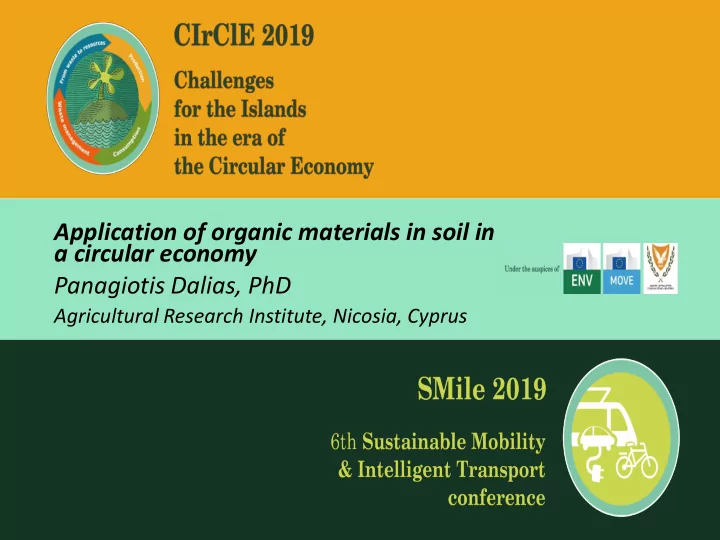

Application of organic materials in soil in a circular economy Panagiotis Dalias, PhD Agricultural Research Institute, Nicosia, Cyprus
Geographic dis- connect between sites of production and waste disposal The combination of aquaponics systems and grey-water recycling – Thesis by Kilian Siegfried Johannes Schmelmer
Modern prosperity and quality of life has been supported through nutrient application in soils as inorganic fertilizers, which (together with breeding and phytochemicals) was the foundation of the “green revolution”
However, organic Soil Organic matter inputs are not such respiration input as to preserve soil organic matter
Soil organic matter has a great number of benefits as it: ➢ Provides nutrients to plants ➢ Increases infiltration and water-holding capacity of soils ➢ Improves soil structure and helps the formation of soil aggregates ➢ Prevents soil erosion ➢ Can sequester great amounts of carbon
Improvement of physical characteristics of soils infiltration < rainfall Water erosion Wind erosion
Potential soil additives Compost (municipal waste) Manure Sewage sludge Agricultural residues Digestate Forestry residues, biochar, industrial organic waste
Primary productivity or the vegetative biomass in a city is often greater than that would be predicted by the climatic conditions of the region Reasons for increased productivity in residential areas: • Planting – creation of green spaces • Use of potable, drilling and recycled water • Plant care
An assessment of the biomass potential of Cyprus for energy production Nicoletta Kythreotou, Savvas A. Tassou, Georgios Florides
Whereas, there is an urgent need to use organic additives in soils … (to combat desertification, mitigate climate change, increase soil fertility) Whereas, there is availability of such suitable organic materials, which is enhanced due to urbanization, import – export balance, increase of livestock inventory vs human population etc. … The real use of such materials is minimal (geographically restricted or non rational) Compost market is not developed, Cypriot farmers seem not willing to use it and claim that the cost of transport is greater than its benefit. Evidence: *The small number of composting enterprises and their small total annual sales *The lack of compost quality standards
One solution points to quality control and quality assurance schemes for compost production processes. 94 % of the commercial compost users want to have a uniform, high quality product that is independently monitored and accompanied by product use specifications. Subsidy schemes
Key idea of circular economy Operation of symbiotic schemes Require something more than simply a greater degree of communication and cooperation among enterprises. They are structured and designed so that the survival of each activity is the prerequisite for the survival of the whole system. In turn, the benefits accruing from the robustness of the system will be beneficial to all.
The practical value of this principle is particularly important in the field of organic material (compost) use in agriculture. Compost enterprises are currently struggling due to restricted sales, they demand increases in gate fees and failed up to now to create a single market for organics. Symbiotic organizations are organized in such a way that composters work in close cooperation with farmers and transfer directly their product to fields. They operate locally with great opportunities for expansion.
Farmers claim that the cost of transport of bulky materials such as compost is not profitable. Usually this is true… unless synergies are operated or composting operation is carried out on farm Why farmers only should pay the bill for the solution of a mainly urban waste management problem? Why the " polluter“, the waste generator, should not be asked to cover also transport and application costs? Symbiotic operations give the opportunity for close synergies and participation of the farmers to the whole chain of economic activities.
Symbiotic schemes can advertise to consumers, that their products come from companies committed to the most sustainable closed loop manufacturing methodologies. The products that are marketed are not, therefore, only the physical products but also the processes by which these products are produced. Labelling and packaging could be used by marketers to encourage potential buyers to purchase such products. Local communities could more easily appreciate goods that are produced locally with procedures that “recycle” materials produced from their own “waste” with low carbon footprint.
Conclusion The current antithesis between the need of organic inputs in soil and reality could find a solution in symbiotic schemes than include collectors, composters, farmers and traders. Inside these schemes synergies can reduce costs and through these schemes better selling prices can be achieved.
Tha hank nk yo you u for yo your ur at attention ention Agricultural Research Institute dalias@ari.gov.cy
Recommend
More recommend